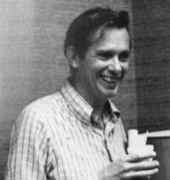Person: Keller (3), Joseph Bishop

Errett Bishop was an American mathematician who worked in analysis.
Mathematical Profile (Excerpt):
- Errett did not find High School at all challenging and when he was sixteen, wanting to progress with his education in a way that was not happening at school, he applied and was accepted for a special scholarship program at the University of Chicago.
- Starting his university studies in 1944, Bishop graduated with a B.S. from Chicago in 1947 and continued to study for his Master's degree which was awarded in 1947.
- Bishop had been taught by Paul Halmos when he was studying for his B.S. and it was Halmos who supervised his doctoral studies.
- However Bishop spent 1950-52 in the U.S. army.
- After completing his basic army training Bishop was sent to undertake mathematical research at the National Bureau of Standards.
- Returning to Chicago in 1952 Bishop submitted his doctoral thesis Spectral Theory for Operations on Banach Spaces in 1954.
- Having submitted his thesis, Bishop was appointed as an instructor in mathematics at the University of California at Berkeley.
- Bishop's work is so wide ranging that it is difficult to give an overview in a biography such as this.
- Let us look at the book Selected papers which was published in 1986 and reprints some of Bishop's most significant contributions.
- Here Bishop worked on uniform algebras (commutative Banach algebras with unit whose norms are the spectral norms) proving results such as antisymmetric decomposition of a uniform algebra, the Bishop-DeLeeuw theorem, and the proof of existence of Jensen measures.
- In 1965 Bishop wrote an excellent survey Uniform algebras examining the interaction between the theory of uniform algebras and that of several complex variables.
- An examples of a paper by Bishop on this topic is Spectral theory for operators on a Banach space (1957).
- He introduced the condition now called the Bishop condition which turned out to be very useful in the theory of decomposable operators.
- Examples of Bishop's papers in this area are Analyticity in certain Banach spaces (1962).
- Bishop become interested in foundational issues around 1964, about the time he was at the Miller Institute.
- Many other areas of mathematics were given the constructive treatment by Bishop.
- In the following year Bishop published Schizophrenia in contemporary mathematics which gave his principles of constructivism.
Born 24 July 1928, Newton, Kansas, USA. Died 14 April 1983, San Diego, California, USA.
View full biography at MacTutor
Tags relevant for this person:
Origin Usa
Thank you to the contributors under CC BY-SA 4.0! 

- Github:
-

- non-Github:
- @J-J-O'Connor
- @E-F-Robertson
References
Adapted from other CC BY-SA 4.0 Sources:
- O’Connor, John J; Robertson, Edmund F: MacTutor History of Mathematics Archive
